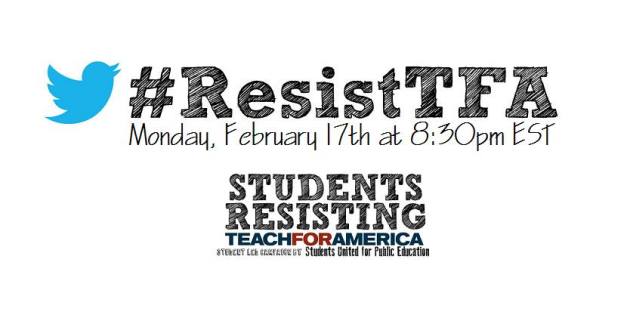Cloaking Inequity: Help! I Need Your Advice. Should I Apply to Teach For America?

Teach For America (TFA) is soooo magnum sexy right now. For example, one of the “charities” that was sponsored during the past weekend’s NBA All-Star festivities was TFA. TFA was placed on a pedestal with the Wounded Warrior Project, UNICEF and the American Heart Association. A colleague of mine texted during the game, “Since when did Teach For America become a charity”… For all of Cloaking Inequity’s posts on TFA go here. One of these charities is not like the other...
Well, Students United for Public Education— a new student led organization— has risen up to oppose TFA. One of members emailed me the following:
Students United for Public Education (SUPE / Stephanie Rivera, Hannah Nguyen, et. al.) are hosting a #ResistTFA Twitter Chat on Monday, February 17th at 8:30PM EST. The goal is to get #ResistTFA trending in advance of the final TFA application date this week. Please feel free to participate by Tweeting articles, POVs, etc. Also, if you could mention it in your blog and/or promote it via Facebook & Twitter throughout the day on Monday, that would be greatly appreciated, too.

Students United for Public Education (SUPE) evolved out of the work of college students involved in defending public education from its attackers. In particular, SUPE was founded to fill a void in the movement for public education — before SUPE, there was no national student organization devoted solely to this cause. Under the guise of “closing the achievement gap” and “school choice,” for-profit corporations and their political representatives have sought to privatize and sell off public education. SUPE understands that a profit motive cannot guarantee a good education. Instead, only a robust and well-supported public education system — along with the courage and will to directly confront problems of racial and economic inequality — can provide a quality education for all.
SUPE is a community based organization because we know that public schools are the heart of every community. In other words, SUPE understands that in order for our goals to be reached, we must work with not only K-12 students, but parents, teachers, and community members as a whole. We are not here to tell any community or students what to do. Rather, we want to work with communities to find what their needs are, and have them lead the way in the struggle as we work as equals to organize the change they believe is best.

Although TFA presents itself as a non-partisan, data-driven philanthropy, it is in fact a sophisticated and efficiently run political organization. We therefore oppose TFA as an organization on political grounds. We resist TFA because we believe that its approach to education is not only immediately harmful to the students, schools, and families that it affects, but also that it actively promotes a vision of both education and society more broadly that furthers inequality and degrades holistic learning.


So here is where your advice comes in…As far as I know, no media outlet or blog has published a request for help from someone applying to TFA. I received a request for your advice from someone who wishes to remain anonymous because they don’t want to be punished by TFA. Have you ever wondered what their thinking process is as they ponder joining TFA? Well, here it is. In the comments, please leave him/her advice (or if you want to remain anonymous, you can email me and I will forward it to him/her) on whether they should apply to TFA by the application deadline this week.
I am an applicant to Teach for America.
I am currently in a teaching position, after a sort. I have daily interactions with children on a K-12 basis in an inner city environment. I am new and never considered a career in teaching before life sent me in this direction. Saying anything else would run the risk of sacrificing my anonymity, and that I already have the feeling I might need to censor my opinion or risk being asked to leave the program is absolutely reprehensible.
When I first heard of TFA, it was from a few different places. I looked through the website. I watched the sleek, expensive videos (JVH, do you have stats on how much they spend on these vids? Maybe we could insert them here?). I got excited at the possibilities. I gathered up my information, filled out the application, wrote the essays. The reason I did these things was because I genuinely believed that TFA would be the means I needed to transition into a full-time career in teaching; I am currently up to my eyeballs in student loan debt and just cannot afford to take on more, regardless of how passionate I am about the kids here and what I do. I was excited. I was pumped up. I told everyone I knew, including three veteran teachers that I have been honored to have as mentors in my career transition.
Not one of them was excited back. In fact, none of them were willing to write a recommendation for me.
I was hurt, at first. But my mentors have never steered me wrong; in fact, everything I’ve learned from them has been more valuable than any district-assigned set of classes I’ve had to take. I defer to them on almost every classroom decision and while I don’t know much about pedagogy or lesson planning or behavior management, their guidance has been key. So, I started doing my research, with the Google phrase: “Why not Teach for America?”
Imagine my surprise when I find an abundance of blog posts and op-eds absolutely shellacking the program. They all came down to just about the same set of complaints:
- They do not recruit teachers for the sake of education.They have many, many corps members that are not planning to continue in a career in education. In fact, it seems like they specifically groom corpsmembers to serve their two years, and then move on to careers such as advocacy, politics, or corporate leadership. As an inexperienced educator looking to become fully credentialed, I appeared to be a statistical rarity. In fact, it almost seems as if they emphasize that being a corpsmember is little more than a means to an end, a sort of blip that’s only meant to be a resume booster.
- In many places, the TFA corps undermines teacher unions.This seemed especially apparent in case studies in Chicago, Philadelphia, and Atlanta: all metro areas that had laid off hundreds of veteran teachers—individuals committed to the well-being of their students—apparently in favor of hiring fresh-out-of-college recruits with almost no education training or real-life experience. The practice creates resentment among veteran teachers for TFA corpsmembers, and families against them, as well. Why pay attention to these new kids, when they’re just another batch of “white saviors”, after all? How many of them could really know anything about working in an inner city environment? How many could actually know what these kids are going through?
- TFA has a track record of undersupporting their corps members.Just Google the phrase “I quit Teach For America”, and you’ll see exactly what I mean. The first two to five years of teaching are always the hardest. How much more is that compounded for people with no formal training in education?
- If you have a problem with their stance or practices, don’t talk about it. The little evidence I’ve seen thus far points to corpsmembers who have gotten perhaps a little too uppity in their tenures. Attend rallies? Advocate for students? Represent anything other than the party line? Don’t quote the buzz words? Expect to be asked to leave; Teach For America is not keen on hearing anything other than what they will tell you at your Summer Institute. In fact, while the website says you’re welcome to join the existing teacher union, there’s almost a sense of “but I wouldn’t if I were you” attached to that.
So what is someone like me supposed to do about hearing things like this? To be perfectly honest, I don’t know. I have wanted to become fully credentialed for a while now, and it appears this is still the best avenue by which to do that. I want to make a difference, though I wish it could be in my hometown. That option is not available to me. And another $20-25,000 in student loan debt is not really something I can afford. I’ve been conflicted for a while over what I should do next, and I don’t know who to ask. I don’t feel like I’m among the average TFA candidates, but I don’t want to exacerbate the problem.
Thus, my question to the educational community at large is: Do I let the ends justify the means and become part of the TFA machine?
So what do you think? Please leave your thoughts in the comments or email them to me and I will forward them to him or her.
YOU CAN HELP: Do you have documents or information about TFA? Are you a TFA teacher that wants to share your experience in a blog. It’s okay if it doesn’t read like TFA’s slick promotion materials. Send to jvh@austin.utexas.edu
This blog post has been shared by permission from the author.
Readers wishing to comment on the content are encouraged to do so via the link to the original post.
Find the original post here:
The views expressed by the blogger are not necessarily those of NEPC.
